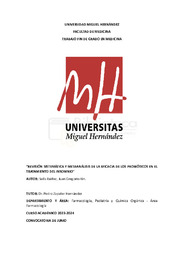Please use this identifier to cite or link to this item:
https://hdl.handle.net/11000/35581Full metadata record
| DC Field | Value | Language |
|---|---|---|
| dc.contributor.advisor | Zapater Hernández, Pedro | - |
| dc.contributor.author | Solís Ibáñez, Juan Gregorio Kin | - |
| dc.contributor.other | Departamentos de la UMH::Farmacología, Pediatría y Química Orgánica | es_ES |
| dc.date.accessioned | 2025-02-05T12:55:07Z | - |
| dc.date.available | 2025-02-05T12:55:07Z | - |
| dc.date.created | 2024-05-14 | - |
| dc.identifier.uri | https://hdl.handle.net/11000/35581 | - |
| dc.description.abstract | Introducción: El insomnio, un trastorno del sueño altamente prevalente, conlleva un deterioro significativo en la calidad de vida y un aumento en el riesgo de desarrollar comorbilidades médicas y psiquiátricas. A pesar de las terapias disponibles, el manejo efectivo de esta patología sigue siendo objeto de investigación. En este contexto, la investigación emergente sobre la conexión entre el microbioma intestinal y la salud mental ha revelado que los probióticos podrían desempeñar un papel terapéutico en el manejo del insomnio. Objetivos: Identificar y cuantificar la evidencia existente procedente de ensayos clínicos aleatorizados sobre el impacto del uso de probióticos orales en el tratamiento del insomnio. Métodos: Se realizó una búsqueda de ensayos clínicos aleatorizados existentes, a fecha de febrero de 2024, utilizando las bases de datos de PubMed, Scopus y Google Scholar. Los criterios de inclusión para la selección de estudios fueron los siguientes: 1) Ensayos clínicos aleatorizados. 2) Ensayos clínicos en población humana. 3) Los grupos de intervención y control recibieron suplementos probióticos y/o simbióticos y placebo, respectivamente. 4) Los estudios incluían resultados relacionados con el sueño o el insomnio como resultados primarios o secundarios. El metaanálisis se realizó centrado en la variación del índice de calidad del sueño de Pittsburgh (PSQI) en los estudios que incluyeron esa variable. Resultados: La revisión sistemática incorporó siete estudios que cumplieron con los criterios de inclusión, realizando el metanálisis sobre la variación en la escala PSQI en cuatro de ellos. Los resultados de los estudios analizados utilizaron distintas variables de evaluación y sus resultados fueron diversos. Un hallazgo consistente entre los estudios fue la presencia de diferencias significativas en la calidad del sueño cuando se evaluó dentro del mismo grupo antes y después del tratamiento. Sin embargo, no se encontraron diferencias significativas al comparar estos cambios entre los grupos de intervención y placebo. El metanálisis reveló una mejora estadísticamente significativa en la puntuación PSQI del grupo experimental en comparación con el grupo control, aunque esta no se considera clínicamente significativa. Conclusión: La evidencia actual es insuficiente para acreditar el uso clínico de los probióticos en el tratamiento del insomnio. Se necesita más investigación para verificar su eficacia y aplicabilidad. | es_ES |
| dc.description.abstract | Introduction: Insomnia, a highly prevalent sleep disorder, leads to a significant impairment in quality of life and an increased risk of developing medical and psychiatric comorbidities. Despite the available therapies, the effective management of this pathology continues to be the subject of research. In this context, emerging research on the connection between the gut microbiome and mental health has revealed that probiotics could play a therapeutic research role in the management of insomnia. Objectives: Identify and quantify existing evidence from randomized clinical trials on the impact of the use of oral probiotics in the treatment of insomnia. Methods: A search for existing randomized clinical trials was performed, as of February 2024, using the PubMed, Scopus and Google Scholar databases. The inclusion criteria for the selection of studies were the following: 1) Randomized clinical trials. 2) Clinical trials in human population. 3) The intervention and control groups received probiotic and/or synbiotic supplements and placebo, respectively. 4) Studies included outcomes related to sleep or insomnia as primary or secondary outcomes. The meta-analysis was carried out focusing on the variation of the Pittsburgh Sleep Quality Index (PSQI) in the studies that included this variable. Discussion: The systematic review incorporated seven studies that met the inclusion criteria, performing meta-analysis on the variation in the PSQI scale in four of them. The results of the studies analyzed used different evaluation variables and their results were diverse. A consistent finding across studies was the presence of significant differences in sleep quality when assessed within the same group before and after treatment. However, no significant differences were found when comparing these changes between the intervention and placebo groups. The meta-analysis revealed a statistically significant improvement in the PSQI score of the experimental group compared to the control group, although this is not considered clinically significant. Conclusion: Current evidence is insufficient to support the clinical use of probiotics in the treatment of insomnia. More research is needed to verify its effectiveness and applicability. | es_ES |
| dc.format | application/pdf | es_ES |
| dc.format.extent | 31 | es_ES |
| dc.language.iso | spa | es_ES |
| dc.publisher | Universidad Miguel Hernández | es_ES |
| dc.rights | info:eu-repo/semantics/openAccess | es_ES |
| dc.rights | Attribution-NonCommercial-NoDerivatives 4.0 Internacional | * |
| dc.rights.uri | http://creativecommons.org/licenses/by-nc-nd/4.0/ | * |
| dc.subject | Insomnio | es_ES |
| dc.subject | Trastornos del Inicio y del Mantenimiento del Sueño | es_ES |
| dc.subject | Probióticos | es_ES |
| dc.subject | Revisión Sistemática | es_ES |
| dc.subject | Metaanálisis | es_ES |
| dc.subject.other | CDU::6 - Ciencias aplicadas::61 - Medicina | es_ES |
| dc.title | Revisión sistemática y meta-análisis de la eficacia de los probióticos en el tratamiento del insomnio | es_ES |
| dc.type | info:eu-repo/semantics/bachelorThesis | es_ES |

View/Open:
Solís Ibáñez, Juan Gregorio Kin-TFG.pdf
906,77 kB
Adobe PDF
Share:
.png)
